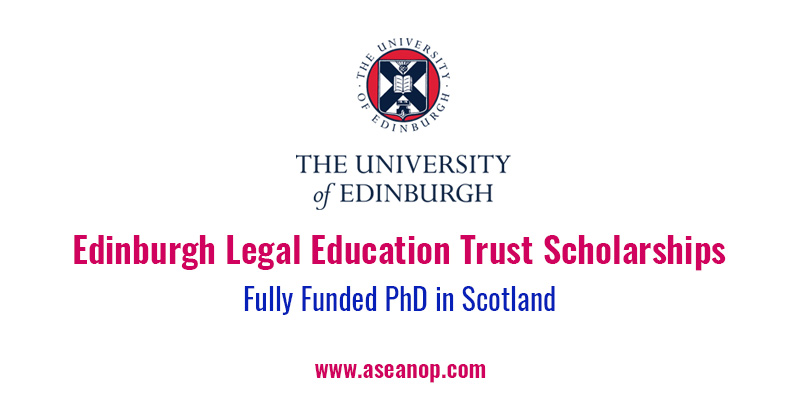Edinburgh Legal Education Trust Scholarships for PhD (Fully Funded)
Two scholarships are available for postgraduate research in Scots private law at the University of Edinburgh for the 2021-2022 academic year.
The scholarship is available for postgraduate research in Scots private law at the University of Edinburgh leading to the degree of PhD. The scholarship is offered by the Edinburgh Legal Education Trust, which was formed in 1996 for the advancement of legal education. The Trustees wish to award a scholarship for study beginning in September 2021.
Award
The scholarship will cover tuition fees (at the home level) and provide a stipend with the same value as a studentship awarded by UKRI, approximately £15,590 per year. In addition, a limited amount of assistance may be given by the Trust in respect of research expenses, but this will not normally exceed £400 in a year.
Fees will be paid by the Trust directly to the University of Edinburgh. The maintenance allowance will be paid in four equal instalments on 15 September, 15 December, 15 March and 15 June.
The scholarship is awarded for one year in the first instance, but will be renewed annually for a further two years, subject to satisfactory progress.
Choice of Topic
Applicants are free, indeed expected, to choose their own topic. The emphasis, however, should be on legal doctrine rather than on, for example, legal theory or socio-legal issues. Historical or comparative perspectives are welcome. A list of possible topics is given in the Appendix but there are many others. Professor Kenneth Reid ([email protected]) or Professor Andrew Steven ([email protected]), the Scholarship Administrators, would be happy to give informal advice. Examples of the type of work that the Trustees are willing to fund may be found in nine PhD theses now published by the Trust as books:
- Ross Gilbert Anderson, Assignation (2008)
- Andrew J M Steven, Pledge and Lien (2008)
- Craig Anderson, Possession of Corporeal Moveables (2015)
- Jill Robbie, Private Water Rights (2015)
- Daniel J Carr, Ideas of Equity (2016)
- Chathuni Jayathilaka, Sale and the Implied Warranty of Soundness (2019)
- Alasdair Peterson, Prescriptive Servitudes (2020)
- Alisdair D J MacPherson, The Floating Charge (2020)
- John MacLeod, Fraud and Voidable Transfer (2020)
The first six of these are available to download free of charge at the Edinburgh Law Seminars website
Eligibility
The scholarship is open to anyone who, by the start of the PhD programme, holds an honours or a masters degree in law (or equivalent), and who is accepted by the University of Edinburgh for postgraduate study. Preference will be given to those holding a masters degree. A possible route into the PhD is to enrol in the first instance for the one-year degree of LLM by Research (for which the Edinburgh Legal Education Trust also provides a scholarship) and then, if things go well, to switch to the PhD in the course of the year; after switching the student is deemed always to have been registered for the PhD.
If you liked this article, then please join our WhatsApp Group for More tutorials. You can also find us on Twitter and Facebook.
Disclaimer: Contents provided and/or opinions expressed here do not reflect the opinions of The Charity Reporters or any employee thereof.





